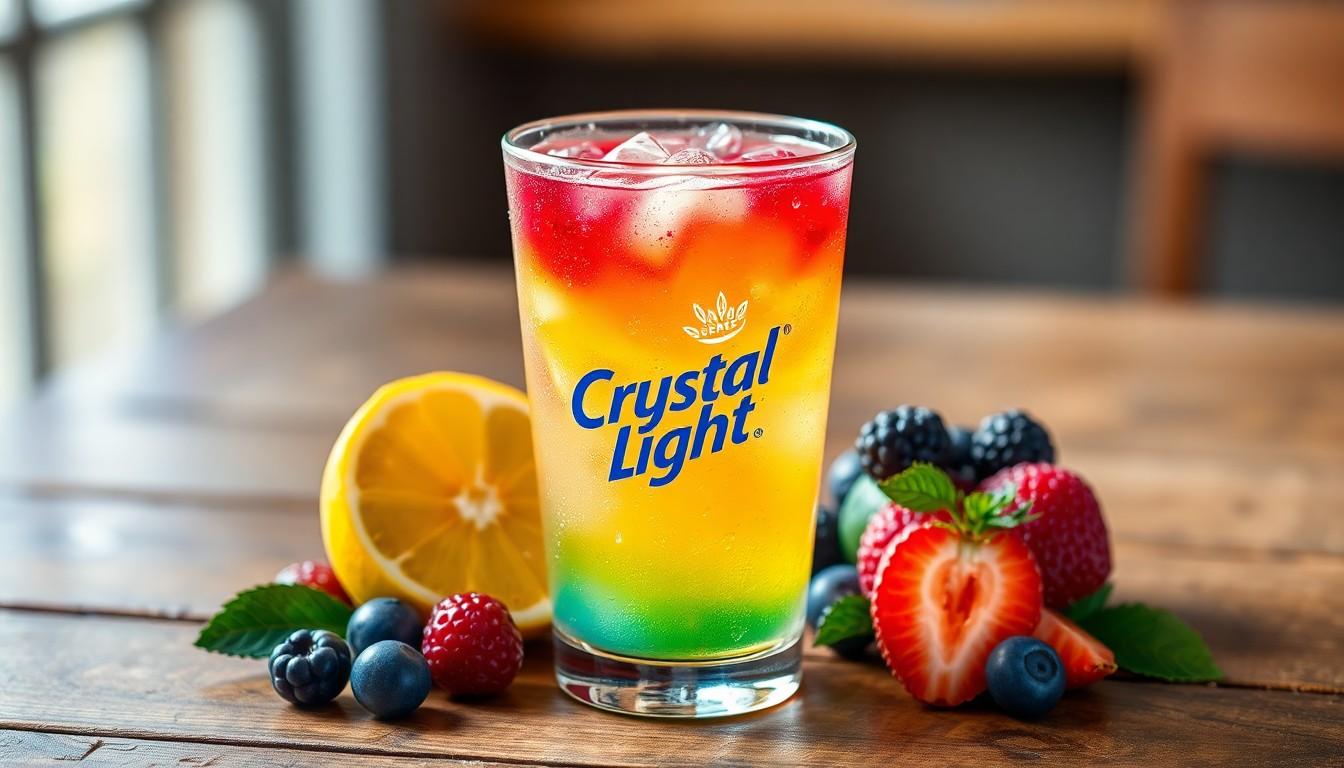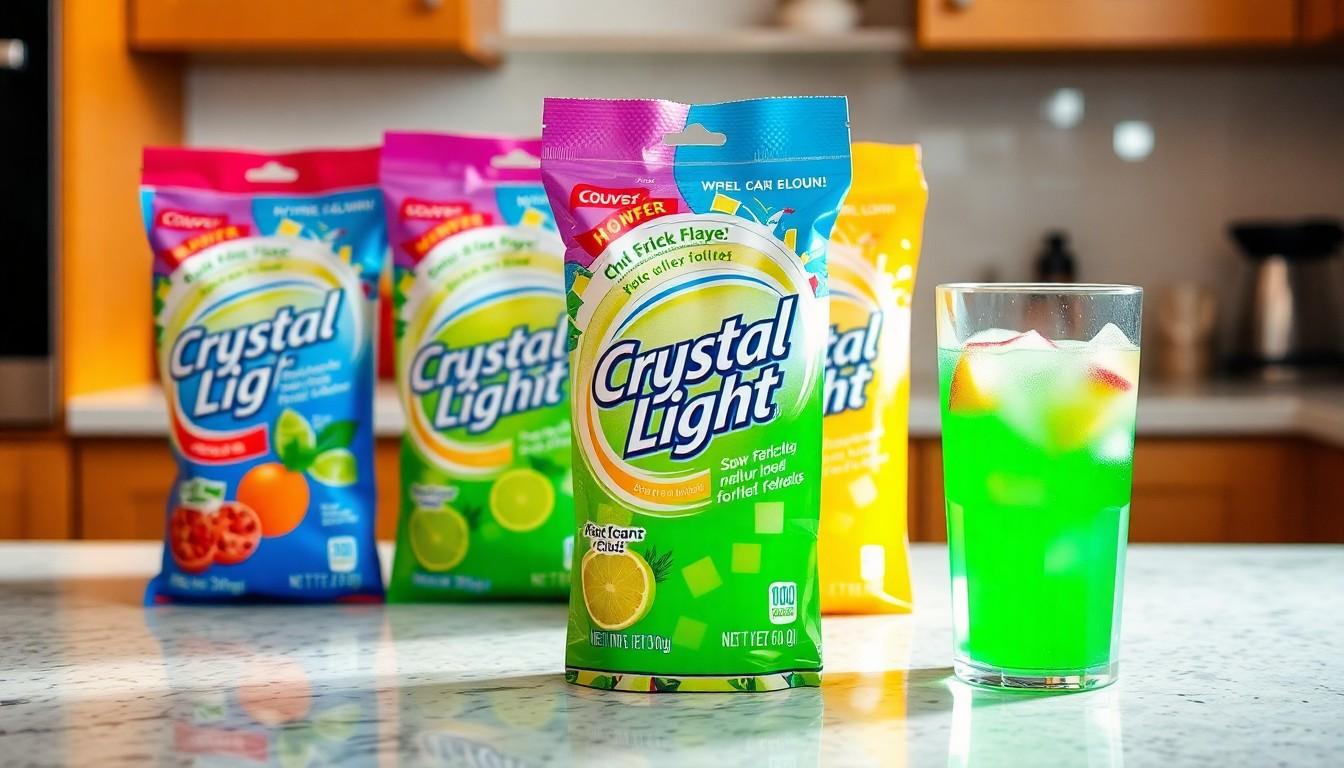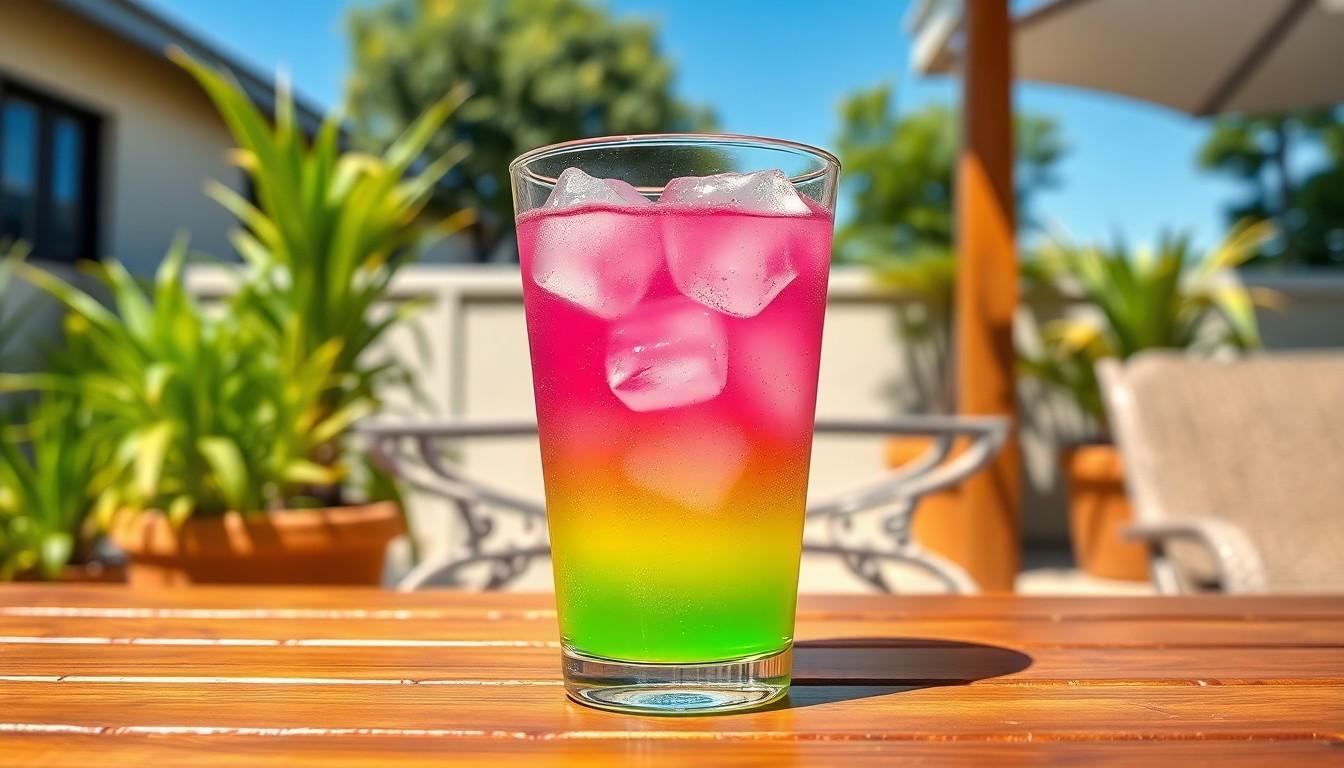Table of Contents
ToggleCrystal Light has long been the go-to for those looking to jazz up their water without breaking the calorie bank. But with so many flavors and options, it’s easy to wonder: what’s really in that little packet of magic? Is it a guilt-free hydration hero or just another sugary mirage?
Dive into the world of Crystal Light nutrition facts, where the numbers tell a story that’s more exciting than the latest reality TV drama. Whether it’s the tantalizing taste or the promise of zero calories, understanding what’s in these drink mixes can help anyone make informed choices. So grab a glass, and let’s unravel the delicious mysteries behind Crystal Light—because hydration should always be a little fun, right?
Overview of Crystal Light
Crystal Light offers a variety of flavored drink mixes aimed at individuals seeking low-calorie hydration options. It’s marketed as a convenient way to enhance the taste of water without the added sugars found in many soft drinks. Each serving typically contains only 5 calories, making it an appealing choice for those monitoring their caloric intake.
The ingredients include artificial sweeteners such as aspartame and sucralose, which provide sweetness without the extra calories. Sodium levels in Crystal Light may vary by flavor, generally ranging from 20 to 40 mg per serving. Additionally, some flavors contain vitamins like A and C, contributing to daily nutritional needs.
Crystal Light comes in different forms, including powdered drink mixes and liquid concentrates, catering to diverse preferences. A single packet can flavor up to 16 ounces of water, allowing for easy preparation and consumption. Popular flavors include raspberry lemonade, iced tea, and peach mango, each providing a unique taste experience.
While Crystal Light serves as a refreshing substitute for sugary beverages, individuals must consider personal dietary needs. Reading labels ensures awareness of ingredients and nutritional values. Some consume it sparingly, while others integrate it regularly into their hydration strategies.
Choosing Crystal Light may include evaluating its impact on overall health and wellness, especially for those sensitive to artificial ingredients. Understanding nutritional facts enables informed decisions about hydration and contributes to healthier lifestyle choices. Each flavor offers a specific profile, making it essential to review options before picking a favorite.
Ingredients of Crystal Light


Crystal Light contains various components that contribute to its flavor and low-calorie profile. Understanding these ingredients is essential for making informed hydration choices.
Natural Flavors
Natural flavors add a pleasant taste to Crystal Light drink mixes. Derived from plant or animal sources, these flavors aim to enhance the beverage experience without introducing additional calories. They provide a flavorful option that appeals to consumers seeking alternatives to sugary drinks. Each flavor can create a unique drinking experience, from fruity notes to refreshing accents. Additionally, natural flavors can often mask the taste of artificial sweeteners, making the drinks more enjoyable.
Artificial Sweeteners
Artificial sweeteners play a significant role in Crystal Light’s nutritional profile. Aspartame and sucralose serve as primary sweetening agents, delivering sweetness without the calories typically found in sugar. These sweeteners provide an intensity about 200 to 600 times that of regular sugar, enabling Crystal Light to maintain a low-calorie count of around 5 calories per serving. While convenient, some individuals may experience sensitivity to these ingredients. Reading labels for possible reactions ensures consumers stay informed about their choices regarding artificial sweeteners.
Nutritional Information
Crystal Light offers various drink mixes with specific nutritional values. Understanding these facts aids in making informed hydration choices.
Caloric Content
Crystal Light only contains 5 calories per serving, making it a low-calorie drink option. Different flavors maintain this low-calorie count, allowing for enjoyable hydration without excess calories. It’s crucial to note that these beverages replace higher-calorie sugary drinks, thus supporting healthier lifestyle choices. When consumed, the low-calorie nature contributes positively to daily caloric intake, making it suitable for those monitoring weight.
Vitamins and Minerals
Some flavors of Crystal Light include added vitamins A and C. These nutrients support immune function and skin health, adding nutritional benefits beyond hydration. Each serving can help meet daily vitamin requirements, particularly for individuals lacking these vitamins in their diets. The presence of these vitamins distinguishes Crystal Light from other beverage options, enhancing its appeal for health-conscious consumers.
Health Benefits of Crystal Light
Crystal Light offers several health benefits, particularly for those seeking low-calorie drink options.
Hydration Benefits
Hydration plays a crucial role in overall health. Drinking Crystal Light can encourage increased water intake by enhancing the taste of plain water. It typically contains minimal calories, making it an enjoyable way to stay hydrated without consuming excess sugar. Many flavors provide a refreshing alternative for individuals who struggle to consume enough fluids daily. Additionally, with its variety of flavors, it caters to different taste preferences, helping ensure hydration remains enjoyable.
Weight Management
Weight management can be more achievable with Crystal Light. Each serving averages only 5 calories, making it a practical choice over higher-calorie beverages. Substituting sugary drinks with Crystal Light can reduce overall caloric intake, assisting in weight loss efforts. The presence of artificial sweeteners provides sweetness without the added calories typical in sugary drinks. Finding low-calorie options like this can facilitate maintaining a balanced diet while satisfying cravings for flavor.
Considerations and Drawbacks
Potential drawbacks exist with Crystal Light, despite its appealing low-calorie profile.
Sugar Content
Crystal Light contains no sugar, making it an enticing option for those monitoring their intake. While the absence of sugar reduces calorie count, some consumers might crave the taste of sweetness that sugar naturally provides. Artificial sweeteners like aspartame and sucralose replace sugar, offering sweetness without additional calories. These sweeteners can offer intense sweetness, up to 600 times that of sugar. Those accustomed to sugary drinks may find the taste of Crystal Light different, requiring an adjustment period to fully appreciate the flavor.
Allergens and Sensitivities
Individuals with specific dietary restrictions must be cautious when consuming Crystal Light. Some flavors may contain allergens, such as artificial colors or additives. Allergic reactions can occur with certain artificial ingredients, necessitating scrutiny of the label before consumption. Sensitivities to aspartame or other sweeteners also warrant attention, as they may lead to headaches or gastrointestinal discomfort for some people. Reading ingredient lists allows consumers to make informed choices that align with their health needs.
Crystal Light offers a low-calorie alternative for those looking to enhance their hydration experience. With only 5 calories per serving and a variety of flavors, it caters to health-conscious individuals seeking to reduce sugar intake. The inclusion of artificial sweeteners allows for a sweet taste without the added calories typically found in sugary beverages.
However, it’s essential for consumers to be aware of the ingredients and potential sensitivities associated with artificial sweeteners. Reading labels ensures that individuals can make choices that align with their dietary needs and preferences. Overall, Crystal Light can be a beneficial addition to a balanced lifestyle, promoting hydration while providing a flavorful twist to plain water.






